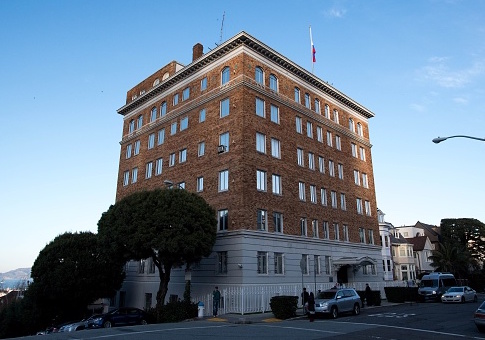The Trump administration took two major diplomatic steps against Russia Thursday—one that would close Moscow's consulate in San Francisco and annexes in D.C. and New York and another that aims to block Russia from gaining control of any part of the U.S. energy market owned by Russian ally Venezuela.
The State Department on Thursday announced that "in the spirit of parity" it would force Moscow to close its Consulate General office in San Francisco and annexes in Washington, D.C., and New York City. The deadline for the closures is Sept. 2, State Department spokeswoman Heather Nauert said in a statement.
The move is retaliation for Moscow forcing the United States to downsize its diplomatic staff by 755 in Russia after Congress in late July imposed additional sanctions on the country in response to allegations it meddled in the U.S. presidential election.
"With this action both countries will remain with three consulates each," Nauert said. "While there will continue to be a disparity in the number of diplomatic and consular annexes, we have chosen to allow the Russian government to maintain some of its annexes in an effort to arrest the downward spiral in our relationship."
"The United States hopes that, having moved toward the Russian Federation's desire for parity, we can avoid further retaliatory actions by both sides and move forward to achieve the stated goal of both of our presidents: improved relations between our two countries and increased cooperation on areas of mutual concern," she said.
However, the United States retains the right to take additional moves against Russia, Nauert warned.
"The United States is prepared to take further action as necessary and as warranted," she said.
Moscow will still maintain more diplomatic and consular annexes than the United States does in Russia. Additionally, the United States will not force Russia to reduce the size of its staff in the country and will allow them to operate in other U.S.-based Russian consular offices, a senior administration official told reporters in a conference call Thursday.
"We are not expelling any Russians at this time," the official said. "We have informed the Russians that they may be reassigned to other diplomatic posts."
The official would not elaborate on why the administration chose to shutter Russia's San Francisco consulate, noting only that it is "one of the oldest and established of the four" that previously existed.
The Trump administration Thursday also reportedly laid plans to prevent Russia from gaining entry to the U.S. energy markets by gaining control of nearly half of Venezuela's Citgo Petroleum Corp's units shares.
Citgo has a large presence in the United States and represents roughly five percent of U.S. crude-oil refining capacity, according to the Wall Street Journal.
Washington's plans to block Russia's stake in any Citgo energy sales—and possibly any land the government-owned company has in the United States—is a sign of escalating tensions between the United States and Russia amid U.S. concern that Moscow is trying to broaden its influence in Latin America.
Russia has helped prop up the government of Venezuelan President Nicolas Maduro, a key ally, while the country has become further engulfed in economic and political crises. Rosneft provided $1.5 billion in loans last year to cash-strapped Petroleos de Venezuela (PdVSA), the parent company of Citgo, and its owner, the Venezuelan government. PdVSA has offered Rosneft nearly half of Citgo's shares as collateral for the loans, and U.S. officials are worried that Russia would gain control of those shares if Citgo defaults.
In announcing new sanctions against Venezuela last week for Maduro's efforts to dismantle the country's democracy, a senior administration official told reporters that if Rosneft gets a major stake in Citgo, the United States would take further actions.
